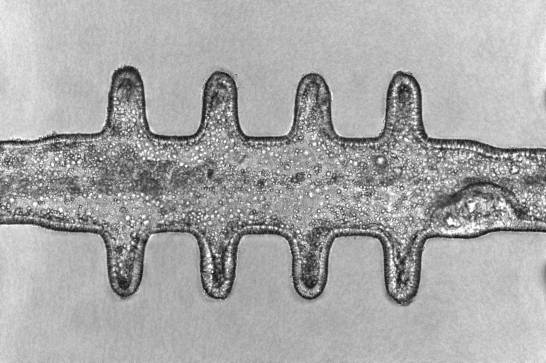The Organoids They are a miniaturized and simplified version of an organ. These plants produced in vitro They show realistic anatomy in three dimensions and are used to analyze the behavior of cancer cells.
Until now, organoids have been limited by their inability to configure more complex processes involving multiple cell types and levels of tissue organization. In these cases the examination must be carried out in Animal models. However, these are more difficult to observe in real time and at high resolution, in addition to their ethical implications and high costs.
A study published today in the journal Nature presents a Organoid model of colon cancer able to create tumors in the laboratory. These cell cultures will help to study the complex processes associated with this malignant growth and to discover new therapeutic approaches.
These organoids, developed by researchers at the Federal Polytechnic School in Lausanne (Switzerland), can also be activated blue light to create tumors at specified locations, which can then be tracked in high resolution for several weeks.
The experts found that the cancer cells here developed tumors with the same efficiency and pathology as in mice, suggesting that this is a representative model for the development of colorectal tumors in animals.
“Our study enabled us to develop the first model Ex vivo (outside the body) in which the process of tumor formation can be recreated in a biologically realistic way,” he explains to SINC. Luis Francisco Lorenzoa Spanish researcher working at the Swiss institution and first author of the paper.
More complete picture of the tumor
Scientists claim that these models will help in the development and discovery of genetic targets and drugs Tumor suppressors by providing a more complete picture of cancer progression than cell cultures currently provide.
“The discovery will allow us to carry out Experiments in vitro which were previously only possible in animal models. In this way, not only can the use in cancer research be reduced, but also higher resolution can be achieved for studying the molecular and cellular processes that occur during tumor development,” says Lorenzo.
Our study enabled us to develop the first ex vivo model in which the process of tumor development can be reproduced in a biologically realistic manner.
Although this new technology is a… flexible system for the study of colorectal cancer has certain limitations related to “the”. Reconstruction still partial the tumor microenvironment, which is a key element to adequately model its formation,” he adds.
Of course – concludes the Spanish researcher – “the adaptations could allow their use in the study of other types of cancer and represent a valuable experimental resource for this field.”
Reference:
Lorenzo-Martín, LF et al. “Spatiotemporally resolved colorectal oncogenesis in minicolons ex vivo.” Nature 2024.
